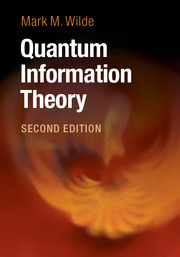Book contents
- Frontmatter
- Contents
- Preface to the Second Edition
- Preface to the First Edition
- How To Use This Book
- Part I Introduction
- Part II The Quantum Theory
- Part III Unit Quantum Protocols
- Part IV Tools of Quantum Shannon Theory
- 9 Distance Measures
- 10 Classical Information and Entropy
- 11 Quantum Information and Entropy
- 12 Quantum Entropy Inequalities and Recoverability
- 13 The Information of Quantum Channels
- 14 Classical Typicality
- 15 Quantum Typicality
- 16 The Packing Lemma
- 17 The Covering Lemma
- Part V Noiseless Quantum Shannon Theory
- Part VI Noisy Quantum Shannon Theory
- Appendix A Supplementary Results
- Appendix B Unique Linear Extension of a Quantum Physical Evolution
- References
- Index
16 - The Packing Lemma
from Part IV - Tools of Quantum Shannon Theory
Published online by Cambridge University Press: 16 February 2017
- Frontmatter
- Contents
- Preface to the Second Edition
- Preface to the First Edition
- How To Use This Book
- Part I Introduction
- Part II The Quantum Theory
- Part III Unit Quantum Protocols
- Part IV Tools of Quantum Shannon Theory
- 9 Distance Measures
- 10 Classical Information and Entropy
- 11 Quantum Information and Entropy
- 12 Quantum Entropy Inequalities and Recoverability
- 13 The Information of Quantum Channels
- 14 Classical Typicality
- 15 Quantum Typicality
- 16 The Packing Lemma
- 17 The Covering Lemma
- Part V Noiseless Quantum Shannon Theory
- Part VI Noisy Quantum Shannon Theory
- Appendix A Supplementary Results
- Appendix B Unique Linear Extension of a Quantum Physical Evolution
- References
- Index
Summary
The packing lemma is a general method for one party to “pack” or encode classical messages into a Hilbert space so that another party can distinguish the encoded messages. The first party can prepare an ensemble of quantum states, and the other party has access to a set of projectors using which he can form a quantum measurement. If the ensemble and the projectors satisfy the conditions of the packing lemma, then it guarantees the existence of a scheme by which the second party can distinguish the classical messages that the first party prepares.
The statement of the packing lemma is quite general, and this approach has a great advantage because we can use it as a primitive for many coding theorems. Examples of coding theorems that we can prove using the packing lemma are the Holevo–Schumacher–Westmoreland (HSW) theorem for the transmission of classical information over a quantum channel and the entanglement-assisted classical capacity theorem for the transmission of classical information over an entanglement-assisted quantum channel (furthermore, Chapter 22 shows that these two protocols are sufficient to generate most known protocols in quantum Shannon theory). Combined with the covering lemma of the next chapter, the packing lemma gives a method for transmitting private classical information over a quantum channel, and this technique in turn gives a way to communicate quantum information over a quantum channel. As long as we can determine an ensemble and a set of projectors satisfying the conditions of the packing lemma, we can apply it in a straightforward way. For example, we prove the HSW coding theorem in Chapter 20 largely by relying on the properties of typical and conditionally typical subspaces that we proved in the previous chapter, and some of these properties are equivalent to the conditions of the packing lemma.
The packing lemma is a “one-shot” lemma because it applies to a general scenario that is not limited only to i.i.d. uses of a quantum channel. This “oneshot” approach is part of the reason that we can apply it to a variety of situations. The technique of proving a “one-shot” result and applying it to the i.i.d.
- Type
- Chapter
- Information
- Quantum Information Theory , pp. 467 - 485Publisher: Cambridge University PressPrint publication year: 2017



